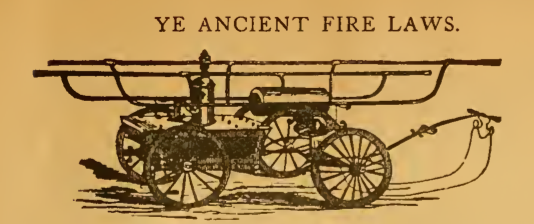
According to a history of Albany produced for the bicentennial celebration of its chartering as a city, concern about fire was one of the first things taken up by the new government. On October 26, 1686, the Common Council ordered “That ye fyremasters goe about and visite each respective house in ye city to see if their chimneys and fyrehearths be sufficient, and also that care be taken that ye ladders and fyre hooks be upon there places and in repare.” (Conservative talk show hosts please note how government actually worked in your imagined glory days of our founders.)
In 1731, the first fire department was organized, with fire masters appointed by ward, and the first hand engine was bought the following year. In 1740, the first engine house was ordered built; in 1743, Robert Lansingh, Bernardus Hartsen and Michael Bassett were appointed to take charge of the engine in case of fire, for which they were to be paid annually six schepels of wheat.
A new fire engine from London arrived in 1763, the same year that the Common Council purchased forty-eight leather buckets; each alderman and assistant were the keepers of four buckets each, all of which were numbered. Any persons permitting their chimney to become foul with soot so that it should catch fire were to forfeit the sum of forty shillings; a reward of three pounds was offered for discovering a fire, and every householder was to have two leather buckets (brewers, tavern keepers and bakers were to have three) with the initial letters of the owner’s name marked on each bucket. In case of fire or any alarm it was ordained that all persons were to immediately “illuminate and set three or more Candles in their front windows until Day Light unless the fire or alarm was sooner extinguished or quelled.” At a fire, the fire engines and tools were to be under the care and direction of the mayor and recorder, the first two aldermen and the sheriff; “these officials had the ranking, placing and directing of the people to hand the water buckets at the fire.”
(By the way, the ‘y’ in “Ye” was not a ‘y’ as we understand it, but the letter thorn, which had a sound pretty much the same as ‘th’ — so pronounce it “the,” not “ye.”)

Thank you for my fun fact of the day – the letter thorn. So much for Ye Olde Gifte Shoppe.